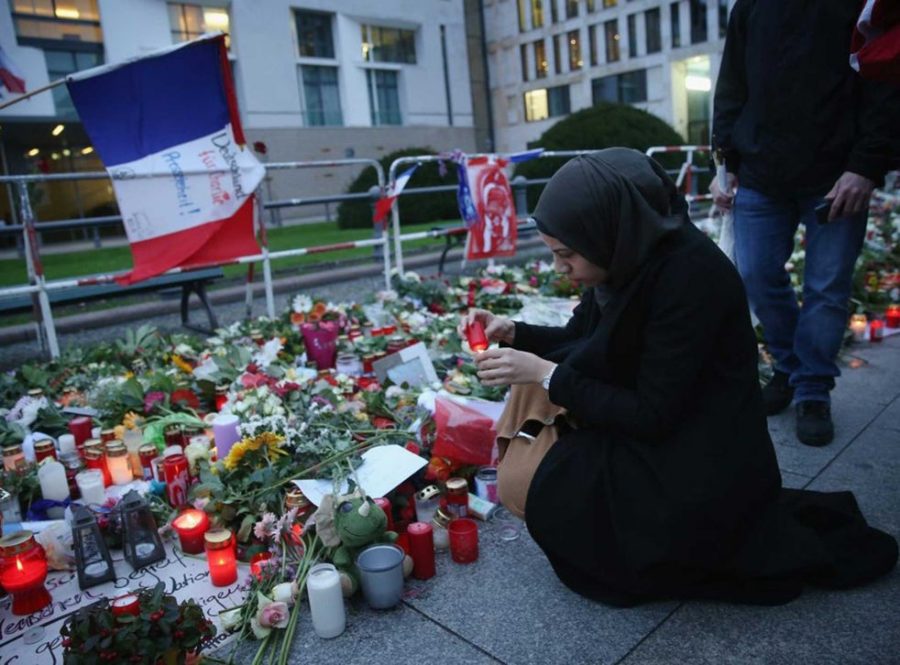French Terrorism: Problems to be Solved on Both Sides
November 22, 2020
On Thursday, October 29th, the coastal French city of Nice was rocked by what President Emmanuel Macron labeled as an “Islamist terrorist attack.” The fateful event totaled three deaths, as well as a nationwide outcry of grief. The victims include a 60-year-old woman who was described as “virtually beheaded,” 44-year-old Brazilian born Barreto Silva, and 55-year-old Vincent Loquès. The knifeman was reportedly shot by police, wounding him severely and placing him in the hospital. The attack took place just two weeks after the gruesome beheading of a school teacher in a Paris suburb. What in a normal situation would be described solely as a tragedy, has instead been the subject of controversy.
Recently, President Macron has been under fire following his choice not to condemn cartoons of the prophet Muhammad that Muslims deemed as offensive. Protests were sparked in response, as many called for the removal of said cartoons. Instead, Macron said that France would not change it’s rights to caricature, as well as saying, “I consider it our duty to protect our freedoms and our rights.” The killing of Samuel Paty, a French teacher, was due to the showing of said controversial illustrations, creating an even bigger rift with the nation’s large Muslim population, which makes up around 10% of the countries inhabitants, the biggest total in Europe. The controversy has even spread globally, with Pakistan, Afghanistan, Bangladesh, Mali, and Lebanon all being host to protests against France. On top of this, Macron seemingly added fuel to the flames by increasing the number of soldiers deployed in the protection of public places from 3,000 to 7,000.
Unfortunately, France is no stranger to terrorist attacks; in fact, it has experienced them more than most. Five years ago, gunmen killed 12 people in the offices of Charlie Hebdo, the weekly satirical magazine that published the cartoons of Muhammad. Later that year, the infamous Paris terrorist attacks were conducted, leaving a total of 130 dead. Around eight months later, 86 people in Nice were killed after a gunman drove into a crowd of unsuspecting bystanders who were celebrating Bastille Day. There have been a total of 72 terrorist incidents spanning the past 5 years in France, a tally that casts a dark shadow over the past decade. Much of the reason behind the intense campaigns against Islamist radicalization directly stems from the frequent nature of terrorism in the country. The consequence of these actions has led to increased discrimination, racism, and targeting towards Muslims, who believe they’re being singled out because of their religion.
Muslims in France face day-to-day challenges when grappling with racism, especially when government officials such as Éric Ciotti make statements such as, “Our country is at war! …We must annihilate the Islamists!” Other ways that Islam is specifically targeted are evident within legislation. In 2011, a law was passed that banned face veils for Muslims. Six years later, France proposed a bill that allowed officials to search homes and close places of worship. Perhaps the biggest influence on the deeply rooted islamophobia once again relates back to Emmanuel Macron, who has described the religion as, “…in crisis,” along with a statement saying France should, “diminish Islamists.” Being constantly looked at as a threat is the harsh reality for a majority of Muslims in France.
While the conflicts continue, one thing is for sure; the French people don’t want or need any more blood spilt. Currently, France is in the midst of a second lockdown, so while they attempt to deal with one issue, the other looms in the background. With everyone at home, the protests, controversy, politics, and disagreements linger on, with seemingly no end in sight.
